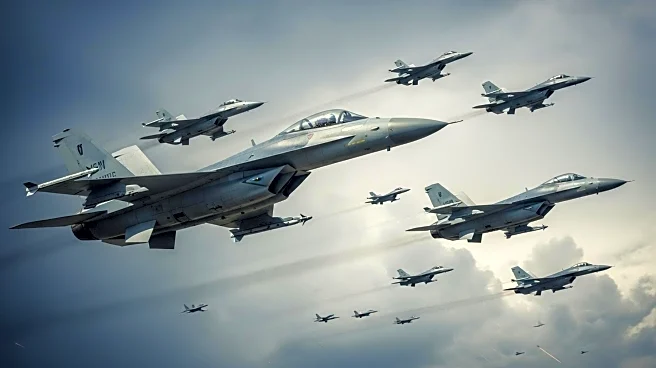What is the story about?
What's Happening?
Poland has scrambled fighter jets in response to a series of Russian missile and drone attacks on Ukraine, particularly targeting the western city of Lviv. The Polish military confirmed the deployment of allied NATO aircraft to ensure the safety of Polish airspace. The attacks resulted in five fatalities, including four members of a family in Lapaivka, and left tens of thousands without power. Ukrainian President Volodymyr Zelensky reported that Russia launched over 50 missiles and approximately 500 drones, marking one of the largest assaults on Ukraine's energy infrastructure since the full-scale invasion began in 2022. The strikes affected multiple regions, including Zaporizhzhia, Chernihiv, Sumy, Kharkiv, Kherson, Odesa, and Kirovohrad, leading to emergency power outages and disruptions in public transport.
Why It's Important?
The escalation of Russian attacks on Ukraine's infrastructure highlights the ongoing volatility in Eastern Europe and the potential for broader regional impacts. Poland's proactive defense measures underscore the heightened security concerns among NATO members, reflecting the alliance's commitment to safeguarding its borders. The attacks exacerbate Ukraine's energy crisis as winter approaches, increasing the urgency for international support and defense agreements, particularly in air defense capabilities. The situation poses significant challenges for Ukraine's civilian population, with widespread power outages affecting daily life and economic activities. The international community's response, including potential diplomatic efforts, will be crucial in addressing the humanitarian and geopolitical ramifications of these developments.
What's Next?
Ukraine is likely to intensify its calls for enhanced air defense systems and international support to counter the aerial threats posed by Russia. The ongoing conflict may prompt further military and diplomatic actions from NATO and other allies, potentially leading to increased military aid or strategic deployments in the region. The situation could also influence upcoming diplomatic negotiations, with Ukraine seeking a unilateral ceasefire in the skies to pave the way for real diplomacy. As the conflict continues, the humanitarian impact on Ukraine's civilian population will remain a critical concern, necessitating coordinated international relief efforts.
Beyond the Headlines
The recent attacks may have long-term implications for regional security dynamics, potentially influencing NATO's strategic posture and defense policies. The conflict underscores the ethical and legal challenges associated with military engagements and the protection of civilian infrastructure. Additionally, the situation may catalyze discussions on energy security and resilience, as countries reassess their energy dependencies and infrastructure vulnerabilities in light of geopolitical tensions.















